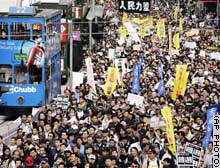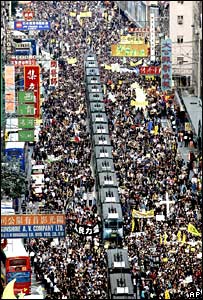
250,000 people took part in the march.
Thousands march in Hong Kong
AP
December 4, 2005
HONG KONG, China (AP) -- Tens of thousands of people marched through the streets of Hong Kong Sunday to protest the slow pace of democratic reforms, intensifying pressure on the government to speed up the movement toward full democracy.

250,000 people took part in the march.
Organizers said about 250,000 people, with many clad in black, took part in the march -- much higher than analysts' estimate of between 50,000 to 100,000. But police said they counted only 40,000 people when the march began in Hong Kong's Victoria Park. Many joined the rally along the way.
"One man, one vote. Popular elections," chanted the protesters, who kept streaming through Hong Kong's busy downtown streets to the government headquarters in the Central district until several hours after the march started.
Pro-democracy lawmakers, who organized the rally, said the higher-than-expected turnout means Hong Kong leader Donald Tsang should rethink his political reform package that falls far short of full democracy.
"He should reflect directly to the state leaders that there is a huge turnout today, so they should rethink the package and let Hong Kong people have a timetable for universal suffrage," said Lee Wing-tat, head of Hong Kong's biggest opposition, the Democratic Party.
A broad spectrum of people participated in Sunday's protest, with many parents bringing their children, elderly, teachers and office workers.

Streets crowded with protestors.
Hong Kong's former No. 2 official and first-time marcher, Anson Chan, also took part. Chan, who remains highly popular and influential despite quitting as head of the civil service in 2001, had previously drawn fire from Beijing by criticizing it for rejecting quick democratic reforms.
"I just feel there are moments in one's life that when you have to stand up and be counted. And for me, this is one of those moments," Chan told reporters before the march. "I believe democracy to be good for Hong Kong and in good time, when the time is ripe, it would also be good for my country."
Other marchers also expressed a desire for greater political rights.
"We need to choose a perfect and suitable leader by ourselves, not by the central government," said Kirby Leung, a 55-year-old sales manager.
The Hong Kong government has argued the Chinese territory isn't ready for full democracy. It has urged the public to support its political reform package that critics said was too conservative. Pro-democracy legislators have refused to endorse the proposal and demand a road map that specifies when and how Hong Kong will become fully democratic, as promised under the territory's mini-constitution.
Two massive pro-democracy marches helped trigger the territory's first leadership change since the handover. Both protests -- in 2003 and 2004 -- drew half a million people demanding the right to pick their leader and all lawmakers.
When Hong Kong was a British colony, its rulers denied the people the freedom to elect their leaders and full legislature. The tradition has continued since the city returned to China in 1997 under a "one country, two systems" formula that promised to give Hong Kong a wide degree of autonomy.
Pro-democracy groups argue that Hong Kong deserves full democracy because it has a highly educated, sophisticated population living in one of Asia's most stable and prosperous cities.
But Hong Kong's leader, Donald Tsang, and Beijing insist that much needs to be done before the city becomes fully democratic. They claim Hong Kong's political culture is still immature and extensive discussions need to be held about how democracy would work.
One of Sunday's marchers, Palu Cheung, 42, disagrees. He took his four-year-old daughter with him to the rally.
"I want my daughter to know that I do this for her and for myself. I think we have the quality to select our own government. I'd like to show the Chinese government that we Hong Kongers can do democracy," Cheung said.
Some analysts say that Beijing is stalling on democratic reforms because the Communist leadership fears that it would lose control of Hong Kong's government -- which under a democracy would care more about answering to the public.
The government's political reform package calls for doubling the size of the 800-member committee that picks Hong Kong's leader. The reforms also propose expanding the 60-member legislature. Half the members are directly elected, while the other half are selected by interest groups.